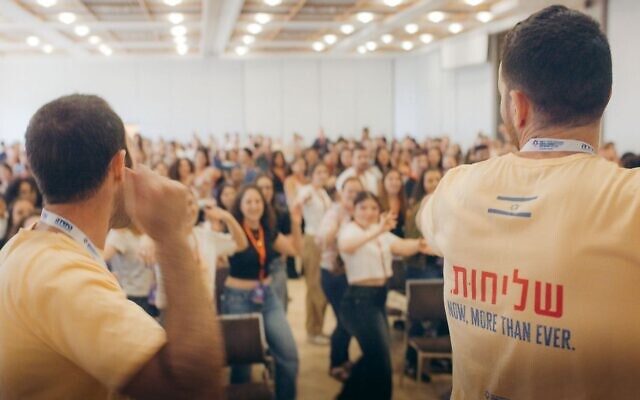How US Jewish Summer Camps Plan to Welcome Israeli Staff
Those who are hired will arrive at camp after months of living under fire — and in some cases after fighting in Gaza.

(JTA) — After spending three summers as an Israeli emissary at Camp Young Judaea Sprout Lake in upstate New York, Shahar Vaknin made a decision. “I was 100 percent sure I’m done with camp,” he said.
Then came Oct. 7, when one of Vaknin’s cousins was killed in the Nova music festival massacre. He returned home immediately, stepping away from his job as a long-term emissary at the Richmond, Virginia, Jewish federation to be with his family.
After he landed in Israel, he began hearing from his campers — around 20 of whom called, emailed or sent videos to check in. They said, “We love you and we miss you,” he recalled. “We hope to see you this summer,” some wrote.
“First of all, it made me cry,” Vaknin told the Jewish Telegraphic Agency. “Because I realized that — pardon my French — but it made me realize that, ‘F—, I love those kids so much. So much. I miss them so much.’”
Now, Vaknin plans to return to Sprout Lake. He’s looking forward to being in a “known familiar place.” But he also realizes that his time at camp will not be an escape from the war.
“Coming and talking about it as if it’s something that’s in the past because now we’re at summer camp — no,” Vaknin said. “And telling us, ‘Put it aside, you’re in a summer camp’ — no. I don’t want to, and I will not, put it aside.”
That mix of feelings is common to the estimated 1,500 Israelis — most ages 20 to 23 — who will work at Jewish camps across North America this year, according to those tasked with placing and training the emissaries, known in Hebrew as shlichim. While the number of roles has remained steady, the Jewish Agency for Israel, which runs emissary placement, says more Israelis applied to work at camps this summer than in any previous year.
Those who are hired will arrive at camp after months of living under fire — and in some cases after fighting in Gaza. Once there, they will contend not only with their own mental and emotional burdens, but also with the challenge of explaining the war to campers and American staff. That’s in addition to the linguistic and cultural barriers emissaries face every year.
“The conversations I’m having with camps are mostly about, how are we going to take care of the shlichim? What do we need to know and how can we be more sensitive?” Gal Atia, who runs the shlichim program for the Jewish Agency, told JTA.
“A lot of them are coming right out of the army and from an intense experience, for everyone in Israel, but especially for that age group,” Atia added. “They aren’t experienced educators, or experienced people, that they can handle, necessarily, to hear everything.”
Atia is in the midst of a series of seminars for American camp directors, many of whom visit Israel during the spring to meet prospective staff. Alongside his typical recruitment and training processes, Atia is also offering a webinar on how to welcome Israeli staff who may need extra support.

The Jewish Agency is working with a number of other Jewish groups — including the Foundation for Jewish Camp, the Anti-Defamation League and M², The Institute for Experiential Jewish Education — to offer resources for both the Israeli staff and the camps themselves. And the training isn’t only for Americans. One key component, Atia said, is helping the Israelis understand what American Jews have experienced since Oct. 7.
“We saw the importance of them understanding more about the current life of Jews in North America, especially, and in the rest of the world when it comes to exposure to antisemitism,” Atia said. “Because in the last six months, we were really busy with what’s going on in Israel. But not a lot of them are understanding of the importance of meeting their brothers and sisters from the other side of the ocean, and meeting them where they are.”
Jamie Simon, the chief program officer at the Foundation for Jewish Camp, said the trainings will help camps understand “how to welcome Israelis in this moment — what does it mean to be helping them heal and grieve and feel supported while in a diverse community?”
Simon said FJC has guided camps on Israel programming in the past, but called this year’s offerings “a new approach” — both due to the war and the spike in reports of antisemitism that has come alongside it.
“In light of the rise of antisemitism and rise of the war in Israel and Gaza, the tragedies of 10/7, we’re really trying to think about, okay, what does this mean?” Simon said. “What is the current landscape? And how are we going to really relook at Israel curriculum in camps and ensure that camps have the tools they need to be successful with this summer?”
The Israeli staff’s objective, Atia said, should be to connect with campers, not to act as representatives of their government or military. For Vaknin, it’s crucial that camps understand what Israelis are going through — starting with the fact that the war is ongoing.
“You want to be able to put your voice out there,” Vaknin said. “To come and say, firsthand, ‘You guys, I don’t know what you saw on social media, but I’m there.’”
He added that tending to Israelis’ needs may also mean not mentioning the war at all. “Sometimes it’s a topic that we don’t want to talk about,” he said. “Some people go to summer camp as an escape. They don’t want to be in Israel experiencing everything right now.”
As criticism of Israel has grown in the months leading up to the summer, some camps have faced pressure from parents or staff to scrap activities focused on Israel or its food and culture. While Young Judaea is a Zionist organization, Vaknin said he, as well as shlichim at other camps, are encountering what he deems to be anti-Israel sentiments from fellow counselors.
But even if those conversations are uncomfortable, he said, they can still be meaningful.
“A lot of people are going to hear opinions that they are not going to like,” he said. “I can only hope that both sides will learn a bit from those kind of harsh conversations.”
Atia also anticipates moments of tension once the Israelis arrive at camp. But while no one can say what will happen in the war between now and June, he hopes to prepare Israelis for tough conversations — even in a place where they feel at home.
“It’s tools we’re trying to give them before they come,” he said. “We’re trying to have them listen to things that are challenging here before they hear them there.”



comments